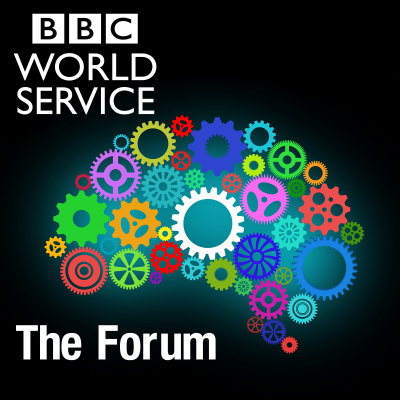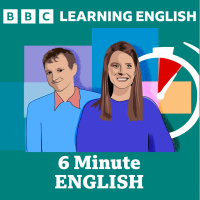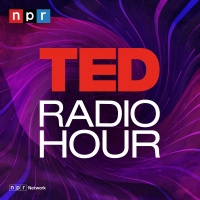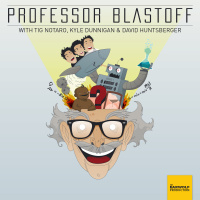Sinopse
A world of ideas
Episódios
-
Twenty Thousand Leagues under the Seas
04/04/2019 Duração: 39minIt is an all-time adventure classic, a novel by Jules Verne that started life in serialized form 150 years ago and has gripped readers ever since, making it one of the most translated works in publishing history (and yes, the original French title says 'seas' in plural). It also made a household name out of its main character, Captain Nemo, the troubled and enigmatic commander who transports us through underwater wonders - including the lost world of Atlantis - in Nautilus, a submarine that itself is a technological marvel. So popular is the story, stars as famous as James Mason, Omar Sharif and Michael Caine have featured in movie versions. But there are dark undercurrents in the novel, themes of anger and revenge, as well as a number of enigmatic passages. To explore the long-lasting appeal of Twenty Thousand Leagues under the Seas, Rajan Datar is joined by Marie-Helene Huet, professor of French at Princeton University and MIT; French writer and translator Laurence Sudret, general secretary of the Société
-
Napoleon: From empire to exile
28/03/2019 Duração: 39minThe story of how an average-sized artillery officer from a small Mediterranean island came to dominate revolutionary France and become the international celebrity of his age is an extraordinary one. Born on Corsica in 1769, Napoleon Bonaparte appeared to avoid engaging with the military career for which he was destined. And yet within a decade, his ambition, ego and enormous talent for self-promotion propelled him to the rank of general and eventually the highest office in France.At the beginning of the 19th century Napoleon’s rise appeared unstoppable. He was declared First Consul for life, then crowned himself Emperor of the French. He brought a period of much-needed stability to France and codified laws and systems which exist to this day. When his wife Joséphine was unable to give him a child, he divorced her and cemented an alliance with Austria’s imperial family. At its height, the Napoleonic empire stretched across most of Western Europe and numbered 40 million people. But his continuing thirst f
-
The spice trade: Selling the scents of luxury
21/03/2019 Duração: 40minThe trade in spices goes back to ancient times: from the Frankincense trails that originated in the Dhofar Highlands in present day Yemen to the Queen of Sheba who travelled to Jerusalem with camels laden with spices. For centuries, spices have captured our imagination far more than any other commodities, and spice traders, from the Arab merchants to the European trading companies of the Age of Discovery, capitalised on the mystique of these luxurious aromatics to create a value chain that led to vast fortunes being made and Empires established. And this worldwide craze for spices played a great part in the rise of globalised trade and the birth of the Stock exchange and the capitalist system.Joining Rajan Datar to discuss the Spice Trade is Professor Gary Paul Nabhan whose ancestors were Arab spice merchants and who’s the author of "Cumin, Camels, and Caravans: A Spice Odyssey", Dr Chris Nierstrasz, Lecturer in Global History at Erasmus University in Rotterdam and specialist on the United Dutch East India Co
-
Moomin Creator Tove Jansson
14/03/2019 Duração: 39minTove Jansson was a Finnish-Swedish author and illustrator best known for her children's books about the Moomins. These white, hippo-like characters live in the imaginary world of Moominvalley where they subtly challenge social norms and utter philosophical statements such as "I knew nothing, but I believed a lot." While the Moomins brought Jansson worldwide fame in the 20th century, she was also a painter, an accomplished novelist and a political cartoonist who took risks poking fun at Hitler. Her work often mirrored her private life in which she defied stereotypes of the time by working and earning money for her family, travelling alone, and having relationships with both men and women.Joining Rajan Datar to discuss the life and works of Tove Jansson are her niece, Sophia Jansson; Boel Westin - a professor of children's literature from Stockholm University and the author of the authorised biography of Tove's life called Life, Art, Words; and British children's author Philip Ardagh, author of The World of Moo
-
Anaesthesia: Unwrapping oblivion
07/03/2019 Duração: 39minMillions of us around the world have undergone an anaesthetic, putting our trust in specialists who keep us alive while surgeons carry out complex operations. Huge advances have been made in this field in the last 150 years, thanks to the work of pioneering doctors, dentists and scientists who often risked their own lives to advance the possibilities of surgery and make anaesthetics safe. And yet in this twilight world of artificial sleep, there are many things experts still don’t understand about what is really happening in the brain and how our consciousness is affected. And what of the reports of patients waking during surgery? How credible are these stories and what can they tell us about memory, consciousness and human experience?Photo: A patient going under general anaesthesia. (BSIP/UIG via Getty Images)
-
Calouste Gulbenkian: The architect of Middle East oil
01/03/2019 Duração: 39minToday, the Istanbul-born Armenian financier Calouste Gulbenkian is mostly remembered as a great art collector and philanthropist; at his death in 1955 he was thought of as the world's richest man. But perhaps more than any of the above, he may have been the world's most tenacious negotiator: how else would he have held on - for decades - to the main source of his fabulous wealth, his minority share in major oil companies, despite their concerted effort to push him out? In the 150th year of Gulbenkian's birth, Rajan Datar follows Calouste's life and deal-making with his great grandson Martin Essayan; historian Dr. Jonathan Conlin, author of a new biography of Gulbenkian; and Professor of Business History Joost Jonker.Photo: Calouste Gulbenkian (credit: Arquivos Gulbenkian)
-
Robinson Crusoe: The man and his island
21/02/2019 Duração: 39minThe story of Robinson Crusoe and his many years of survival alone on a deserted island has enchanted the English-speaking world for centuries. Many people first come across the story as a children’s book or a film portrayal, celebrating Crusoe’s buccaneering adventures and his heroic efforts to tame his wild environment, create shelter and food supplies, and eventually befriend the indigenous man he calls Friday. But closer reading of Daniel Defoe’s original novel, written 300 years ago this spring, reveals a more complex tale of sin and redemption, debating fundamental questions about man’s place in the world against a backdrop of colonial expansion, transatlantic commerce and the slave trade.Bridget Kendall talks to the Defoe scholar Professor Andreas Mueller from the University of Northern Colorado in the USA; Olivette Otele, Professor of History at Bath Spa University in the UK; and Karen O’Brien, Professor of English Literature at the University of Oxford in the UK.Photo: Engraving of Robinson Crusoe by
-
Lu Xun: Writing the story of New China
14/02/2019 Duração: 39minLu Xun has been often been called the father of modern Chinese literature. His short stories about the misery and cruelty of ordinary life in China have been interpreted both as revolutionary political statements inspired by the May Fourth Movement of 1919 which wanted to sweep-away outdated social mores, and as a brilliant new take on ancient Chinese literary traditions. Some of his works, both fiction and non-fiction, have been required reading for Chinese schoolchildren since the communists took charge of education in the country. But - like his life - Lu Xun's work doesn't easily fit under any simple banner and reflects the turbulent, confusing and contradictory history of China in the first three decades of the 20th century.Quentin Cooper talks to Professor Eileen Cheng, the author of acclaimed new translations of Lu Xun into English, Ohio State University Professor Kirk Denton, one of today's leading Lu Xun scholars, Professor Hu Ying from University of California who studies the culture of early 20th
-
The talking drums of West Africa
07/02/2019 Duração: 40minThe Talking Drum is one of the most sacred instruments of West Africa. Shaped like an hourglass, the drum has a unique melodic sound which means it can imitate the tones of language and in this way speak words. Along with its spiritual power and healing properties, the talking drum is also a source of history, poetry and proverbs.Bridget Kendall traces the story of the talking drum to the present day with Mohamed Gueye from Senegal, who descends from a hereditary drummer family, Richard Olatunde Baker who specialises in the talking drum of the Yoruba of Nigeria, the Ivorian-French poet and novelist Veronique Tadjo who focuses on the influence of the talking drum on African literature and the Senegalese-French social anthropologist Dr Hélène Neveu Kringelbach. Photo: (from left to right) Veronique Tadjo, Mohamed Gueye, presenter Bridget Kendall, Richard Olatunde Baker and Hélène Neveu Kringelbach in The Forum studio.
-
The Top of the World
31/01/2019 Duração: 39minThe North Pole lies at the very top of our world. Covered in a thick layer of sea ice, this uninhabitable frozen point in the Arctic Sea has fascinated us for centuries as both a physical location on a map and as a far away place in our imagination. Warmer than the South Pole, the northernmost point of the Earth’s axis sits outside of any time zone in a place where the sun rises and sets just once a year. Today, it has come to symbolise a warming planet but remains linked to exploration and mythology.Joining Bridget Kendall to discuss the North Pole are the explorer, author and former climate scientist Felicity Aston MBE; Klaus Dodds, Professor of Geopolitics at Royal Holloway, University of London, and author of the forthcoming book The Arctic: What Everyone Needs to Know; and Michael Bravo, Senior Lecturer at the University of Cambridge, Head of Circumpolar History and Public Policy Research at the Scott Polar Research Institute and author of a new book called North Pole.Photo: Robert Peary's North Pole Exp
-
The Heel and the Sneaker
24/01/2019 Duração: 39minWhat’s in a shoe - apart from a foot? Shoes can be so much more than a protection and ‘dressing’ of our feet: from Egyptian pharaohs to European paupers, footwear has been linked not just with the wearer’s social and economic standing but also cultural identity, personality and even moral values.Rajan Datar follows the history of footwear with the help of Elizabeth Semmelhack, Senior Curator of the Bata Shoe Museum in Toronto; Giorgio Riello, Professor of Global History and Culture at the University of Warwick; sports shoe historian Thomas Turner; and footwear researcher at the KASK School of Arts in Gent, Catherine Willems.Photo: A fancy high-heeled shoe. (Getty Images)
-
Goya: Seeking truth through art
17/01/2019 Duração: 39minThe 18th Century Spanish artist Francisco José de Goya y Lucientes has been called the “most radical artist that ever lived”. He was not afraid to shock with his depictions of the darkest sides of human nature, and his work still shocks us today. Goya rose from humble beginnings to become the official court painter to the kings of Spain. But while he created dazzling portraits of royals and aristocrats, his personal vision was filled with madmen, witches, beggars, and fantastical creatures of the night. His years in the Spanish court coincided with one of the most turbulent times in the country’s history, and his graphic images of war and suffering reveal a compulsion to make art that changed the way we think about the world.Bridget Kendall discusses Goya’s life and works with Mark Roglán, Director of the Meadows Museum at Southern Methodist University in Dallas, Texas, in the US; Janis Tomlinson, Director of Special Collections and Museums at the University of Delaware in the US; And Xavier Bray, Director of
-
Antigone: A drama of defiance
10/01/2019 Duração: 40minThe play Antigone by the Greek playwright Sophocles was written almost 2,500 years ago, but to this day it is believed to be the most performed play- anywhere in the world. It tells the story of Antigone, a girl who ends up challenging the power of the ruler of Thebes, in a devastating battle of wills that pits family duty against the law of the state. So why does this story of civil disobedience still speak to people, and how was it originally received by its very first audience in Ancient Athens in the 5th century BCE? Joining Rajan Datar to discuss Antigone and its later modern interpretations are the acclaimed actor, director and former Greek Culture Minister Lydia Koniordou, the theatre director Olivier Py who staged Antigone with male prisoners at this year’s Avignon Theatre Festival in France, the Syrian playwright Mohammad Al Attar who’s the author of a new adaptation of Antigone about Syrian women refugees, and Dr Rosie Wyles, Lecturer in Classical History at the University of Kent, and author of “Co
-
The Master and Margarita: Devilish satire
03/01/2019 Duração: 40minThe Master and Margarita by Mikhail Bulgakov, which tells the fantastical story of a visit of the devil to the Soviet Union, is considered to be one of the most successful Russian novels of the 20th Century. Written in secret in the 1930s when Stalinist repression of the arts was at its height, the novel was only published more than 25 years later, when its blend of biting satire and magic realism created a sensation, not just in Russia but also in the West, inspiring rock bands like The Rolling Stones. This programme explores the novel and its cultural influence, and also asks how it reflects Bulgakov’s often traumatic experience as a writer in Stalinist Russia. Joining Bridget Kendall are Julie Curtis, the biographer of Mikhail Bulgakov, and professor of Russian literature at Oxford University, Peter Mansilla-Cruz, the director of the Bulgakov museum in Moscow, Edythe Haber, associate of the Davis Centre at Harvard University and professor emerita at University of Massachusetts, Boston, and Dr Olga Voronin
-
Fermentation: Ancient Food Alchemy
27/12/2018 Duração: 39minWhether it’s kimchi, kombucha, kefir or kraut, fermented foods are today all the rage. And yet people have been fermenting food and beverages for thousands of years – to preserve food stuffs, to break down toxins, to mark rituals and to enhance flavour. Without knowledge of the science, local communities practised fermentation instinctively, through trial and error and by careful observation. In the 18th and 19th centuries, scientists argued over why foods fermented as they did. Many believed in the theory of ‘spontaneous generation’. But it was not until the discoveries of Louis Pasteur that the micro-organisms at work in food which bring about fermentation began to be understood. Ironically, Pasteur’s research led to a widespread preoccupation with killing the very bacteria that aid fermentation – combined with the growth of food production on an industrial scale.More recently, fermented food and drink has been marketed for its health benefits, with claims it can enhance the bacteria in our intestinal
-
The Emergence of Modern Turkey
20/12/2018 Duração: 40min100 years ago, Turkish defeat in World War One signalled the end of the once great Ottoman Empire. What emerged was a European orientated secular republic led by a man who used social engineering to shape Turkey in his own image – Mustafa Kemal Atatürk. Bridget Kendall examines this key period of Turkish history and asks whether modernisation could have been brought in less forcefully, and why the women who were helping bring about similarly progressive ideas were eventually side-lined. And what impact did Ataturk’s social revolution have on the arts and literature? Joining Bridget is Recep Boztemur, Professor of History at the Middle Eastern Technical University in Ankara, Dr Hülya Adak from Sabanci university in Istanbul, who specialises in gender and nationalism, and the actor, theatre director and playwright Yeşim Özsoy, whose latest play examines Turkish identity from 1918 onwards.Photo: A statue of Ataturk located in Marmaris harbor, Turkey. (Artur Widak/NurPhoto via Getty Images)
-
Aleksandr Solzhenitsyn: Revealing the Gulag
13/12/2018 Duração: 39minThe Russian author Aleksandr Solzhenitsyn was a towering literary figure whose novels, chronicles and essays have lifted the lid on the horrors of the Soviet gulag network, which over several decades incarcerated millions of often innocent prisoners. Born a hundred years ago, Solzhenitsyn survived the brutal conditions of a gulag in Kazakhstan and it was this harrowing experience that provided the impetus for his best-known works, starting with his novella, One Day in the Life of Ivan Denisovich and culminating in The Gulag Archipelago, a multi-volume history of the Soviet forced labour camps from 1918 to 1956. Bridget Kendall is joined by two Solzhenitsyn scholars: Professor Daniel Mahoney from Assumption College in the United States and Dr. Elisa Kriza from Bamberg University; and by Professor Leona Toker of Hebrew University in Jerusalem, an expert on labour camp literature.Photo: Aleksandr Solzhenitsyn in Gulag clothing. (Apic/Getty Images)
-
The Iranian Coup of 1953: Overthrow of a Prime Minister
06/12/2018 Duração: 38minIn 1953 Iran’s democratically elected Prime Minister Mohammad Mossadeq was overthrown in a coup. It was billed as a popular uprising in support of Shah Mohammad Reza Pahlavi, yet behind the scenes were the British and American intelligence services. Mossadeq had swept to power only two years earlier promising to nationalise Iran’s vast oil reserves, but this, along with an apparent Communist threat, worried the two western governments whose post-war economies relied heavily on access to Iranian oil. Rajan Datar discusses the coup with Iran scholar Ervand Abrahamian, professor of modern Iranian history at St Andrews University Ali Ansari and journalist and author Azadeh Moaveni.(Photo: Rioters armed with staves shout slogans, during riots in Tehran, August 1953. Credit: AFP/Getty Images)
-
Diaghilev and the ballet revolution
29/11/2018 Duração: 39minThe Russian dance impresario Sergei Diaghilev transformed not only ballet, but all the arts in the 20th century. His ground-breaking Ballets Russes burst onto the scene in Paris in 1909 and replaced stuffy set pieces with shockingly vibrant performances that brought together scenery by artists Picasso and Matisse, costumes by Coco Chanel, avant-garde music by Stravinsky and Prokofiev, and a new style of movement from innovative dancers such as Nijinsky. The Ballet Russes became the world’s leading dance company for nearly quarter of a century, and its creative impulse still influences dance, music and art today. Bridget Kendall explores Diaghilev and the Ballets Russes with Lynn Garafola, Professor of Dance at Barnard College, Columbia University in the US; Jane Pritchard, Curator of Dance at the Victoria and Albert Museum in London; and the French dance writer Laura Cappelle.Photo: Portrait Of Sergei Dyagilev (Fine Art Images/Heritage Images/Getty Images)
-
Charlie Chaplin
22/11/2018 Duração: 39minFor many people, Charlie Chaplin and the Tramp, a character he created at the start of his film career, are synonymous. This funny little man with a black moustache and a waddling gait, dressed in baggy trousers and a tight jacket, with oversized shoes and a small bowler hat, made millions of people laugh, turned Chaplin into a household name and - in his day - the highest paid entertainer in the world. But there was more to Chaplin than just a virtuoso physical comedian: he was a versatile actor, writer, musician and director. He carefully fine-tuned every aspect of his feature films, no matter how long it took or what the cost, making him - possibly - the only complete auteur in film history. He had an eye to posterity: even in the early days when films were thought of as disposable, he carefully preserved all his works. And he also had business acumen: with his brother Sydney he masterminded brilliant publicity campaigns, re-releases and lucrative deals. Bridget Kendall is joined by silent film historian









